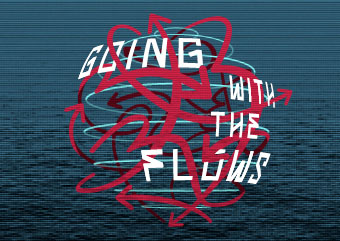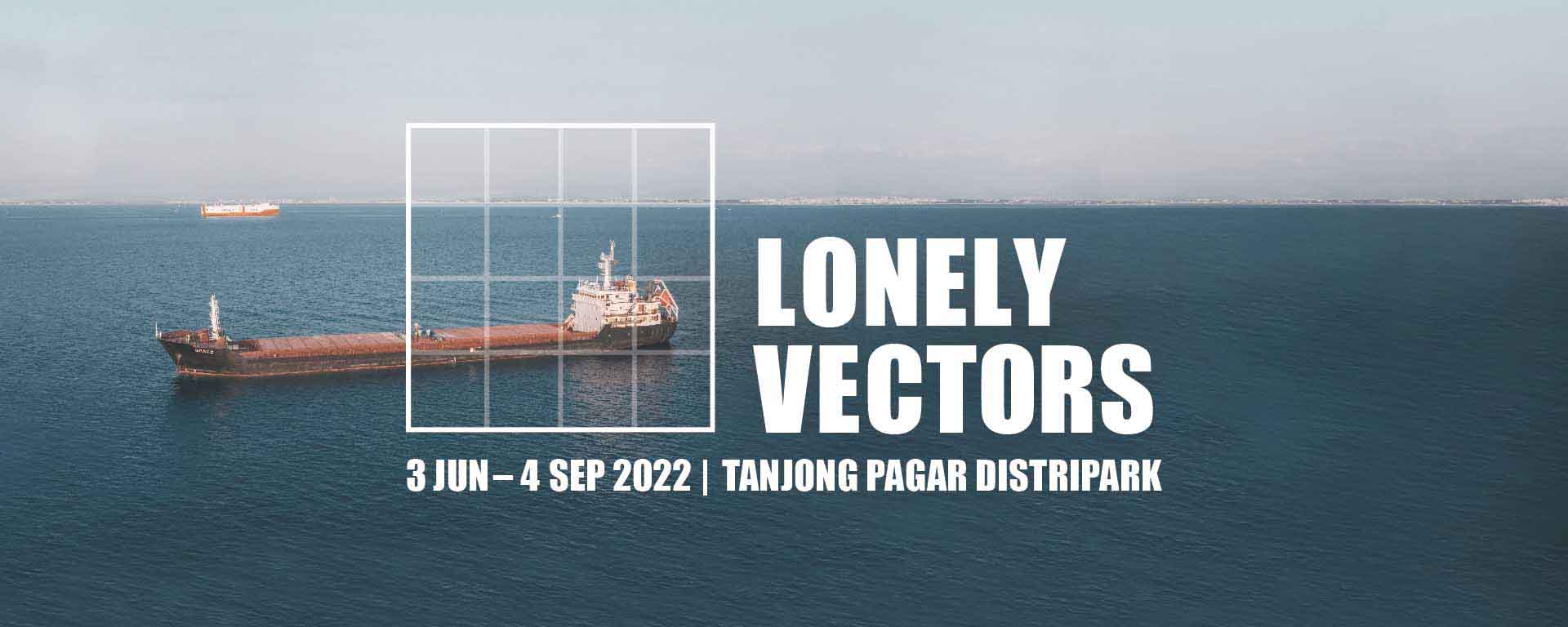Gallery 1, SAM at Tanjong Pagar Distripark
Enjoy free admission from now till 4 Sep: catch Lonely Vectors before it closes.
Lonely Vectors presents a series of artworks and new commissions that draw our attention to the fault lines, choke points, exclusive zonings and infrastructural politics that characterise our global economy. Agricultural and irrigation channels, trade and shipping routes, economic zonings and migratory patterns are engraved across the surface of the earth, and are integral to our contemporary lives. Yet these lines and networks do not simply reflect a linear or smooth flow of goods around the world; they are also evidence of uneven distribution. Lonely Vectors will be showcased across multiple spaces, including local libraries and public hoardings, before coming back to focus on the site of the logistical warehouse at Tanjong Pagar port.
Shu Lea Cheang is an artist and filmmaker whose work aims to re-envision genders, genres, and operating structures. Her genre bending gender hacking art practices challenge the existing operating mechanisms and the imposed boundaries of society, geography, politics, and economic structures. Cheang drafts sci-fi narratives in her film scenario and artwork imagination. As a net art pioneer, BRANDON (1998-1999) was the first work of web art commissioned and collected by the Solomon R. Guggenheim Museum in New York. From homesteading cyberspace in the 90s to her current retreat to post-netcrash BioNet zone, Cheang takes on viral love, bio hack in her current cycle of works. She represented Taiwan with 3x3x6, a mixed media installation at Venice Biennale 2019. She made 3 feature films, FRESH KILL (1994, premiered at Berlinale), I.K.U.(2000, premiered at Sundance Film Festival), FLUIDØ (2017, premiered at Berlinale) which were recently screened at Pompidou Center (Paris) in 2020 and at Hammer Museum Billy Wilder Cinema as a screening series of “Shu Lea Cheang -Crafting a genre of new SciFi Queer Cinema” in 2021. She is currently at work on her fourth feature film, UKI, a Scifi Viral Alt-Reality cinema.
Tiffany Chung's interdisciplinary and research-based practice unpacks spatial transformation, geopolitical partitioning, conflict, environmental crisis, forced displacement and refugee migration by excavating traumatised topographies and their layered histories. Chung has exhibited at the Smithsonian American Art Museum, Washington, D.C.; Museum of Modern Art, New York; Venice Biennale; Sharjah Biennial and Gwangju Biennale, among other museums and events. She received the Sharjah Biennial Artist Prize for Exceptional Contribution (2013), Asian Cultural Council Grant (2015) and Asia Society India Asia Arts Game Changer Award (2020). She is a Mellon Arts & Practitioner Fellow at Yale University’s Center for the Study of Race, Indigeneity, and Transnational Migration (2021).
Cian Dayrit is an interdisciplinary artist whose work investigates notions of power and identity as they are represented and reproduced in monuments, museums, maps and other institutional media. Working with textile, installations, archival interventions and community-based workshops, Dayrit’s works respond to different marginalised communities, encouraging critical reflection on colonial and privileged perspectives. His practice is informed by the experience of colonialism from the perspective of the Philippines but is not tied to a specific position or location. Instead, his work and research extend across geopolitical and supranational spheres.
Ho Rui An is an artist and writer working in the intersections of contemporary art, cinema, performance and theory. Through lectures, essays and film, he probes into how images are produced, circulate and disappear within contexts of globalism and governance. He has presented projects at the Bangkok Art Biennale; Asian Art Biennial, Taichung; Gwangju Biennale; Kunsthalle Wien; Haus der Kulturen der Welt, Berlin; Van Abbemuseum, Eindhoven; and NTU Centre for Contemporary Art Singapore. In 2019, he was awarded the International Film Critics’ (FIPRESCI) Prize at the International Short Film Festival Oberhausen. In 2018, he was a fellow of the DAAD Artists-in-Berlin Program.
Ho Tzu Nyen makes films, installations and performances that often begin as engagements with historical and theoretical texts. Solo exhibitions of his work have been held at the Hammer Museum, Los Angeles (2022); Toyota Municipal Museum of Art (2021); Crow Museum of Asian Arts, Dallas (2021); Yamaguchi Center for Arts and Media (2021), Edith-Russ Haus for Media Art, Oldenburg (2019); Kunstverein in Hamburg (2018); Ming Contemporary Art Museum, Shanghai (2018); Asia Art Archive, Hong Kong (2017); Guggenheim Bilbao (2015); Mori Art Museum, Tokyo (2012) and The Substation, Singapore (2003). He represented the Singapore at the 54th Venice Biennale (2011).
Zarina Muhammad is an artist, educator and researcher whose practice is deeply entwined with a critical re-examination of oral histories, ethnographic literature and other historiographic accounts about Southeast Asia. Working at the intersections of performance, installation, text, ritual, sound, moving image and participatory practice, she is interested in the broader contexts of ecocultural and ecological histories, mythmaking, haunted historiographies, water cosmologies and chthonic realms.
Joel Tan is a playwright and performer based in London and Singapore. His work straddles theatre, film, audio, visual art and essays, and explores the intertwined histories and lived realities of empire, state will-to-power, queerness and the city.
Zachary Chan works in the fields of visual and sound. He is a gamelan musician, sound designer, composer and visual artist. He plays with several groups, notably Gamelan Singa Nglaras and Gamelan Singamurti, and has collaborated with other performing artists such as The Observatory, Bhaskar’s Arts Academy and Tini Aliman. He is also the co-founder of design collective crop.sg.
P7:1SMA is a dance performance company that endeavours to shift perspectives on Malay cultural identity through intimate and innovative performance experiences. P7:1SMA’s Artistic Director, Norhaizad Adam, is a Malay dancer, dance artist and performance maker. His practice explores morality and behaviourism in the contexts of post-colonialism and socio-political change, and reimagines the Malay folk form as a strategy to navigate society’s systemic structures and stereotypes. He has presented works at the Venice International Performance Art Week; Mapping Melbourne; Asia Discovers Asia Meeting, Taipei; Paris Summer Academy; ImPulsTanz, Vienna; and NuArt Sculpture Park, Bandung; among others. In 2021, he was conferred the National Arts Council Singapore Young Artist Award.
Bo Wang is an artist, filmmaker and researcher based in the Netherlands. His works have been exhibited internationally in venues like the Guggenheim Museum and Museum of Modern Art, both in New York; Garage Museum, Moscow; Times Museum, Guangzhou; Para Site, Hong Kong; as well as the International Film Festival Rotterdam and Visions du Réel, Switzerland. He received a fellowship from the Robert Flaherty Film Seminar in 2013 and was an artist-in-residence at ACC-Rijksakademie (2017–2018) and NTU Centre for Contemporary Art Singapore (2016). He is currently a PhD candidate at the Amsterdam School of Cultural Analysis, University of Amsterdam.

Lonely Vectors brings attention to the global system of logistics and economic flows that support – and divide – the world we live in today. Curators Joella Qiu, Kenneth Tan and Mi You tell us more about how Singapore’s history as a port city and the desire to reconnect with fellow artists after the pandemic have inspired the exhibition.
Click to read Going with the Flows on our blog now.
all resources

